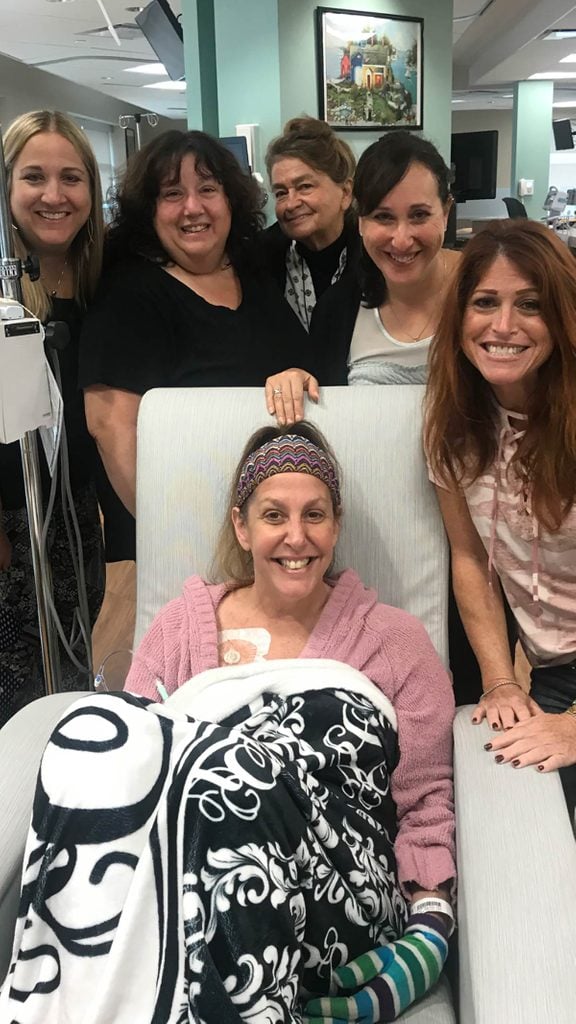My “Abdominal Pain” Turned out to Be Colon Cancer
Updated: Mar. 29, 2021
Amy Driben-Salcedo dismissed the burning in her abdomen as an ulcer—until a colonoscopy revealed she had colon cancer.

People often ignore their own symptoms, and 49-year-old Amy Driben-Salcedo was no exception. She dismissed the burning in her abdomen for four or five months, starting in the summer of 2017. “I have three kids and was just busy with life,” she says. Even after looking up her symptoms online and talking to doctors, though, she never dreamed her symptoms might be colon cancer.
When the pain began, it radiated from hip to hip and then moved to her back. “I Googled my symptoms and decided it must be an ulcer, so I changed my diet to bland foods. I already couldn’t tolerate much food at that point,” she recalls. Still, the high school guidance counselor continued to ignore the pain. But then she began losing weight rapidly. By the time she made it to a doctor’s office, she had dropped 25 pounds.
Driben-Salcedo’s abdominal pain and weight loss were both classic signs of colon cancer, though she dismissed the possibility at the time because she felt she was too young. Other colon cancer symptoms include a change in bowel habits (diarrhea or constipation), rectal bleeding or blood in stools, and weakness and fatigue. Although Driben-Salcedo’s symptoms weren’t silent, they can be: Here are the 6 silent signs of colon cancer.
Finally, in January 2018, Driben-Salcedo made an appointment with a gastroenterologist. The doctor did blood work and x-rays, but everything came back normal. He prescribed her medication for irritable bowel syndrome. “He said I think your colon is out of whack, so we need to get that back to normal.”
After taking the medication for a few weeks with no relief, Driben-Salcedo called the doctor again. “I just didn’t feel right. On the way to the CT scan he ordered, I told my husband, ‘This must be what cancer feels like, I’m in so much pain.'” The scan showed a shadow on her liver. “The GI doctor said that it led him to believe it was a tumor, so he ordered an MRI.”
The MRI revealed multiple tumors in her colon, and her doctor sent her for a colonoscopy right away. The internal scope revealed the truth—she had colon cancer. Over 200,000 cases of colorectal cancer are diagnosed in America annually, with the majority of cases affecting those over 50, though the condition is turning up more frequently in people under 50. The American Cancer Society recently lowered it’s recommended age to receive screening for colorectal cancer from 50 to 45 due to an alarming increase in younger diagnoses. While you can’t control all of the risk facts for colon cancer, here are some of the ones that you can.
“When they first told me, I was numb. I looked at the doctor and said, ‘You just handed me a death sentence, didn’t you?'” He assured her that he hadn’t: “He said other than the colon cancer, your health is perfect. You’re going to beat this. It’s just going to take a long time.”
For the last year, Driben-Salcedo has had chemotherapy every other week, for three days a week. She’s endured brutal side effects, including gum issues, weakness and numbness (neuropathy) in her hands and feet, and sleepless nights. She’s had scans every three months to track her progress; each shows that she’s steadily improving. The latest scan held the best news yet—the cancer is gone.
“It’s beyond exciting,” she says. “The doctors said it’s the best news we can hope for. I don’t know what happens next, but I’m excited.” Her doctors will continue to monitor her, and she’ll continue to get treatment until her doctors say she’s done. Though Driben-Salcedo’s excited about the future, she still regrets not acting on her symptoms sooner. “We have to listen to our bodies. I can’t imagine waiting any longer than I did—shame on me.”
There are several screening options for colon cancer besides getting a colonoscopy every ten years, so be sure to discuss all of them with your doctor. The earlier colorectal cancer is caught, the better. If you’re worried about the screen, here are the best ways to prepare for a colonoscopy, according to doctors.
